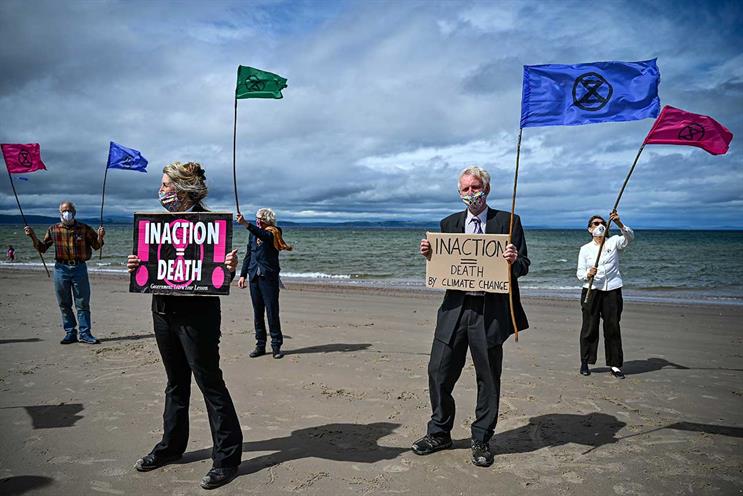It is difficult for anyone who has spent their career in advertising to write about sustainability. After all, our entire industry is built on consumption and worse, supporting a cultural narrative of more stuff being the key to happiness.
That said, as an industry, we have also on occasion enabled brands to do some good in the world. And, despite our less-than-perfect track record, you canŌĆÖt argue with the fact that agencies are also pretty adept when it comes to connecting people to new ideas and concepts.
That was the thinking behind Droga5ŌĆÖs recent Green Pivot forum, which brought together brands and businesses innovating in sustainability and those at the cutting edge of this conversation in broader culture. If the past few months have taught us anything, itŌĆÖs that brands and businesses can no longer afford to be disconnected from culture. If anything, they need to be ahead of it.
Here are some tips on how to create positive change and some fair warning on what will happen if we donŌĆÖt.
Brands and businesses need to reinvent
The changes we need to make are structural. We can no longer only think about initiatives or evolutions of existing ways of working.
We can start by using the brief as an invitation to interrogate what the client really needs to do to serve their audience long term, as Sophie Thomas, founding director of design agency Thomas Matthews, pointed out. In that way, our responses become an opportunity to present sustainable solutions.
Or we can take a step even further back and start to switch to business models that reward companies (or projects) that give back in some way to the environment. For example, The TramperyŌĆÖs founder and chief executive, Charles Armstrong, is doing this with the Evo project, which aims to help start-ups adapt their strategy to a post-coronavirus future. Patagonia, Howies and Penguin Books are all successful companies not just aligned to a purpose but also structured around one, and they are aspirational to consumers as a result.
We donŌĆÖt all have the luxury of a blank page, so perhaps the trick for the rest of us is to approach every brief, project, innovation and plan with the mindset of an activist. Because as Tamsin Omond from Extinction Rebellion said: weŌĆÖre not going to get there without sustained rebellion and without us having these conversations all the time.
We canŌĆÖt do it alone
One of the things we have all seen over the past few months is that not only is collaboration possible, it is also possible at speed. When we have a shared purpose (survival), collaboration is much simpler to arrange.
Something to consider is the simple idea of only collaborating with those doing the right things, as Mark Adams, senior vice-president and head of innovation at Vice, pointed out. For Generation Z, using that behaviour to demonstrate that you are a leader on these issues may well translate to being a leader in your category.
If we want to build back better, we should harness some of the lessons weŌĆÖve learned over the past few months about working together. Importantly, we must also consider whatŌĆÖs next not as a reaction ŌĆō that in itself wouldnŌĆÖt be sustainable ŌĆō but as a focus for our collective efforts around the ŌĆ£otherŌĆØ universal threat to our survival.
ŌĆ£ItŌĆÖs simply better commercially and better for the soul to do things that are sustainable for the long term,ŌĆØ Malcolm Fried, chief marketing officer at Investec, said.
Get started or get left behind
A green pivot is already happening across a range of industries and companies.
What we can learn from them is about ambition: the need to both set ambitious targets but also to innovate ambitiously, beyond the needs or imaginations of our consumers.
Rachel Konrad, chief communications officer at Impossible Foods, emphasised her strong rejection of ŌĆ£this fantasy that we need to overhaul capitalism and come up with a new global world geopolitical order in order to fix the environmentŌĆØ.
ŌĆ£If we could do that, great ŌĆō but frankly we donŌĆÖt have time,ŌĆØ she said.
It makes more sense to make it easier for consumers to do the right thing by giving them better products. ŌĆ£ItŌĆÖs sometimes easy to forget that this is a business design problem, not a brand problem,ŌĆØ Russell Davies, chief marketing officer at Bulb, said.
That said, there is still a role for marketing to play.
Marketing is a way to be transparent about what youŌĆÖre doing and even invite competitors to join in. If they choose not to, fine ŌĆō they are really just putting themselves at a competitive disadvantage, since we have to believe most people, when faced with the option, will make good choices.
In summary, thereŌĆÖs no question that we have to change the way we do business. But perhaps the real aspiration should be to redefine more fundamental concepts.
Imagine a collective, radical and overall change to how we define growth, status, power and aspiration. ThatŌĆÖs the brief that we should all be working on ŌĆō not just as businesspeople or marketers, but as humans. If we do, to quote Kresse Wesling, Elvis & KresseŌĆÖs co-founder: ŌĆ£We will get out of here alive.ŌĆØ
Rebecca Lewis is joint managing director at Droga5 London
Picture: Getty Images


